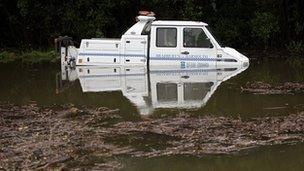Panel attacks flood defence cuts
- Published
- comments

The committee says the government needs to take the threat more seriously
Four times as many homes and firms risk flooding in the next 20 years if the UK does not prepare for climate change, a government advisory panel has said.
The Committee on Climate Change (CCC) blames the government for cutting funds for flood defences.
It says these will be needed more than ever if climate projections prove accurate.
The Environment Department said money for flood defences was "being spent more effectively than ever before".
A spokesman added: "The committee has acknowledged the work we have done to reduce flood risk for 182,000 homes over the last three years.
"We are spending more than £2.17bn over four years to protect people from flooding and our successful partnership funding model will draw in around an additional £72m.
"The money for flood defences is being spent more effectively than ever before and we now expect to exceed our target to better protect another 145,000 homes by 2015."
The CCC report comes as findings suggest CO2 emissions are making extreme weather events much more likely. The CCC says the UK government needs to take this threat more seriously.
Recently 40,000 properties have been built in areas of substantial flood risk.
And while the Environment Agency urged a £20m a year increase in flood defence spending to keep up with climate change, in fact funds were cut by 12%.
Meanwhile less than half of new developments used the sort of porous sustainable drainage systems (SUDS) like porous pavements that help prevent flooding by allowing rain to soak into the ground.
The UK may also face more droughts as well as floods and the committee says the price of water should go up to deter people from using it for their gardens and washing cars.
Growing risk
Lord John Krebs, CCC adaptation sub-committee chairman, said: "We must take adaptation more seriously if we are to manage the growing risk of floods and droughts."
The report follows the publication of the US National Oceanic and Air Administration's (Noaa) annual state of the climate publication.
For the first time it includes a supplementary report attempting to determine if extreme weather events can be linked to human-induced climate change.
The research team, including members of the UK Met Office, identified recent episodes of extreme weather then used a computer to estimate the likelihood of the episode happening in a world without increased CO2.
They say events of the magnitude of last year's heatwave in Texas - by far the most ferocious on record - is now 20 times more likely than it would have been in the 1960s.
In the UK, last November was the second warmest on record since 1659. The paper says that sort of warm winter extreme is now 60 times more likely.
The authors say the UK will still experience cold winter months, but they estimate that temperatures like those in the snow-covered December of 2010 will be only half as likely as before.
The study said that the 2011 floods in Thailand were not linked to climate change. The amount of rainfall was not abnormal, and the severity of the floods was due to other factors.
The team say the study is pushing the limits of science. They say it is much easier for them to attribute temperature changes to climate change than to link changes in precipitation.